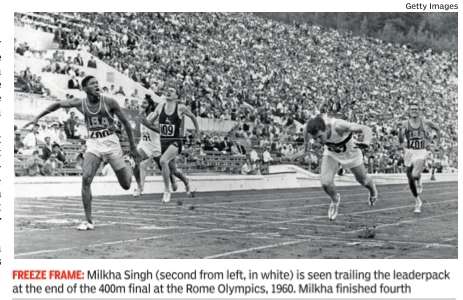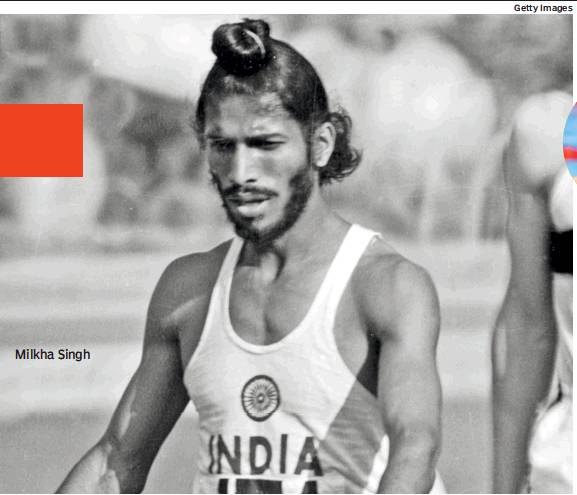Milkha Singh
This is a collection of articles archived for the excellence of their content. |
Contents |
Achievements
A
By K Datta, A race that still stops time in India, August 29, 2017: The Times of India

When Milkha Singh narrowly missed a bronze medal in the 1960 Rome Olympics, television had not invaded our drawing rooms like it did during PV Sindhu's epic battle which sent heart-beats fluctuating with excitement.
In the 1950s and '60s, you had to wait for morning's newspapers for news about Milkha's exploits, perhaps primitive compared to today when news spreads instantly . Yet, the races which the Indian sport's first superstar took part in, at home or abroad, created a buzz whenever he stepped on a track.
Memories are still fresh of the days in September 1960 when Milkha made his way through the heats into the final of the 400 metres final. He began by clocking 47.6 seconds in the first heat, and followed up with running the quarter-final and semi-final heats in 45.5 and 45.9.
Milkha has admitted that he had difficulty falling asleep on the night before the Rome final. Nothing unusual. There were athletics fans back home who also went through a similar experience. But once the starter cracked his gun, our man, running in the fifth lane if memory serves right, was off to a promising start. For some reason, some called it an error of judgement, he slowed down a bit at the 250 metre mark. Otis Davis of the US, Germany's Karl Kaufmann, and Spence were there at the tape ahead of Milkha, who was fourth in 46.5 sec.
Milkha's hopes, as also that of his fellow-countrymen, of winning an Olympic track medal ended in painful disappointment, a pain which endures to this day.
B
Timeline
—Compiled by Tridib Baparnash, June 20, 2021: The Times of India

From: —Compiled by Tridib Baparnash, June 20, 2021: The Times of India
See picture:
Milkha Singh is narrowly beaten to fourth place by South Africa's Malcolm Spence in the 400m final at the Rome Olympics on Sept 6, 1960
1929 Born on November 20 at Govindpura, Punjab province (now in Pakistan)
1947 Moves to India post-Partition amid bloodshed in which he lost his parents
1951 Joins EME, Secunderabad
1953 Joins the Army after receiving training at EME centre
1956 Represents India in the Melbourne Olympics
1958 Wins 200m and 400m gold medals in the Tokyo Asian Games (Beats favourite Abdul Khaliq of Pakistan to win the 200m sprint in the Tokyo Asiad ) Becomes first Indian to win an athletics gold medal by winning the 400m event in the Commonwealth Games at Cardiff (Wales). Wins Gold medals in 200m & 400m at National Games in Cuttack
1959 Awarded Padma Shri, India’s fourth highest civilian award, for his outstanding track achievements
1960 Becomes the first Indian to reach the final of an athletics event in the Olympics as he finished 4th in the 400m race. Earns the title ‘Flying Sikh’ bestowed on him by Pakistan’s President General Ayub Khan in December 1960 when he defeated Abdul Khaliq in a special 200m race at Lahore.
1962 Wins the 400m & 4 X 400m relay gold medals in the Jakarta Asian Games
1963 Marries Nirmal Saini, former captain of Indian volleyball team
1964 Finishes fourth in heat stages of 4 X 400m relay in Tokyo Games; Wins 400m Silver medal at Calcutta (now Kolkata) National Games
2001 Refuses to accept the Arjuna Award, highest award for sports in India, for lifetime contribution, saying he was clubbed with the awardees who were nowhere near the level he had achieved
2013 Autobiography (coauthored by daughter Sonia Sanwalka) The Race Of My Life published; based on the book, a biopic named Bhaag Milkha Bhaag was released the same year
2021 Tests positive for Covid-19, battles valiantly for a month and returns negative before succumbing to post-Covid complications
1958 Commonwealth Games, Cardiff
Milkha Singh, As told to Biju Babu Cyriac, March 31, 2018: The Times of India

From: Milkha Singh, As told to Biju Babu Cyriac, March 31, 2018: The Times of India
I went into the 1958 Commonwealth Games in Cardiff, Wales, after winning two gold medals at the Tokyo Asian Games (men’s 200m & 400m) the same year. With worldclass athletes from Jamaica, South Africa, Kenya, England, Canada and Australia taking part, the competition in Cardiff was very tough. And, the obvious opinion among people in Cardiff was: ‘Arey India kya hai. India is nothing’.
I was not sure I could win a gold at the Commonwealth Games. I never had that kind of faith because I was competing with world record holder Malcolm Clive Spence of South Africa. He was the best runner at the time in 400m.
I will give credit (for the gold which I eventually won) to my American coach Dr Arthur W Howard. The first deputy director of NIS Patiala, Dr Howard was the athletics coach of the Indian team at the Games and planned the entire race strategy. He watched Spence running in the first and second rounds. The night before the final race, he sat on the charpai and my bed and told me: “Milkha, I understand only a bit of Hindi. But I’ll tell you about Mal Spence’s strategy and what you should do.”
The coach told me that Spence would run the first 300-350m slowly (even then his pace was good) and beat his rivals to the tape in the final stretch. “You should go all out from the beginning because you have the stamina,” Dr Howard said. “If you do that, Spence will forget his strategy (of beating everyone in the last few metres).”
I was on the outer lane, No. 5 (those days there were only six lanes) and Spence on the second in the 440-yard final at the Cardiff Arms Park stadium. Those days, lanes were allotted based on the number you picked from a bag and that’s how I got lane No. 5. We had to first run in the preliminary round, then the quarterfinals, semis and final.
I went all out from the start, running very fast till the last 50m. And, just as Dr Howard said, Spence realised that ‘Singh had gone too far ahead’. It was obvious to me that Spence had forgotten his own race strategy as he tried to catch up with me. He ran fast and in the end, he was about a foot behind me. He was close to my shoulders till the very end but couldn’t beat me. I finished in 46.6 seconds and he timed 46.9s. It was thanks to Dr Howard that I won the gold medal.
The gold medal was a big moment for India and I got calls and messages from a lot of people including Prime Minister Pandit Nehruji. He asked me: “Milkha, what do you want?” At that time, I didn’t know what to ask. I could have asked for 200 acres of land or houses in Delhi. I finally asked for one day’s holiday in India.
2017/ WHO’s ambassador (South-East Asia) for physical activity
August 11, 2017: The Indian Express
Sprint legend Milkha Singh has been appointed as the World Health Organisation's goodwill ambassador for physical activity in South-East Asia Region (SEAR), the global health body said
As WHO goodwill ambassador, Singh, also known as ‘the Flying Sikh’, will promote WHO SEAR’s non-communicable diseases (NCDs) prevention and control action plan which seeks to reduce the level of insufficient physical activity by 10 per cent and NCDs by 25 per cent by 2025, Poonam Khetrapal Singh, Regional Director, WHO South-East Asia said.
“Promoting physical activity for health is an important intervention, which is expected to get a significant boost in the region with the support of octogenarian Milkha Singh, a champion for the cause,” she said. According to her, an estimated 8.5 million people die due to non-communicable diseases every year in WHO South-East Asia Region and many of these deaths are premature and nearly all are lifestyle related.
Regular exercise and physical activity help reduce the risk of non-communicable diseases such as heart diseases, stroke, diabetes and cancer – that are now increasingly afflicting people across the world. An alarming 70 per cent of boys, 80 per cent of girls and nearly 33 per cent adults in the region report insufficient physical activity which is becoming a common feature of modern life, Singh pointed out.
WHO recommends at least 60 minutes of physical activity for children daily and 150 minutes of activity for adults weekly to stave off non-communicable diseases. Physical activity helps those aged 65 years and above to maintain cognitive functioning and reduce the risk of depression, the world health body said. To facilitate this, WHO has also been advocating with governments to create public spaces for recreational and organised sport. It has been advocating for physical activity as a “best buy” intervention for reducing the risk of deaths due to NCDs.
“Whatever be the age group, gender, physical ability, or socio-economic background, being physically active is an effective way to ensure a healthy and productive life,” the regional director said. With the support of Milkha Singh, we expect to promote and scale up physical activity in the region to be able to arrest and reverse the NCD epidemic, she said. Milkha Singh is a Padma Shri awardee and had won medals in athletics in Commonwealth and Asian games. He had missed a bronze medal by a whisker in the 1960 Rome Olympics.
